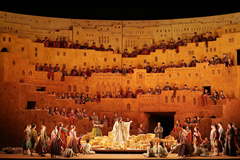| Opera Reviews | 2 May 2024 |
A stirring night at La Scalaby Silvia Luraghi |
|
| Berlioz: Les Troyens Teatro alla Scala 26 April 2014 |
|
|
Les Troyens is not an easy opera to stage, and four companies teamed up for this David McVicar production: besides La Scala, the Royal Opera House Covent Garden, San Francisco Opera, and the Wiener Staatsoper cooperated in producing this challenging Grand-Opéra. The visual result was very compelling. Berlioz’ opera was intended as a diptych, including the heroic drama La prise de Troie, and the more intimate Les Troyens à Carthage. Accordingly, set designer Es Devlin staged the first two acts around the walls of Troy and the other three inside the fortified citadel of Carthage. As the curtain opens, Chorebus is joined by Cassandra at night near the walls of Troy: the Greeks have apparently left and her fellow citizens are rejoicing; she alone is trying to warn them from the coming danger. When the Trojans find the horse and pull it into the town, its giant head peers down from over the walls, offering a sinister view, made up as it is with chariot wheels, shields, and other parts of the dead heroes’ armour. Aeneas makes his entry among the people celebrating the apparent end of the war. At night, he sees Hector’s spirit on the fortifications, and learns about his destiny when the fire suddenly blazes in the town. The second part of the opera starts with the people of Carthage in colorful clothes cheering their queen Dido. The town is built of reddish sand houses, like Berber towns in Northern Africa, and its bright setting contrasts with the gloomy atmosphere of conquered Troy. When Aeneas comes in, leading the survivors from Troy, the queen is immediately captured by his noble appearance. In the course of the fourth act, Dido listens to Aeneas’ story, and the two become increasingly intimate: but their love is doomed to end, when the Trojan hero leaves the queen to follow his destiny. The passionate and yet accurate work of the conductor received an excellent response from the stage, where in particular the two female protagonists, Anna Caterina Antonacci as Cassandra and Daniela Barcellona as Dido, gave their best, both vocally and theatrically. At their side, tenor Gregory Kunde as Aeneas displayed a ringing, heroic voice, with easy top notes and a nicely colored register. All the other singers were equally compelling, as was the chorus. All the performances ignited the audience with an enthusiasm rarely seen at La Scala in the current season. |
|
| Text ©
Silvia Luraghi Photo © Brescia/Amisano © Teatro alla Scala |

 While new dark clouds are gathering over La Scala, with rumors of the early dismissal of general manager elect Alexander Pereira, conductor Antonio Pappano made his long awaited debut with a new production of Hector Berlioz’ monumental masterpiece Les Troyens, which ended in a triumph for the Maestro as well as for the whole company.
While new dark clouds are gathering over La Scala, with rumors of the early dismissal of general manager elect Alexander Pereira, conductor Antonio Pappano made his long awaited debut with a new production of Hector Berlioz’ monumental masterpiece Les Troyens, which ended in a triumph for the Maestro as well as for the whole company. 





